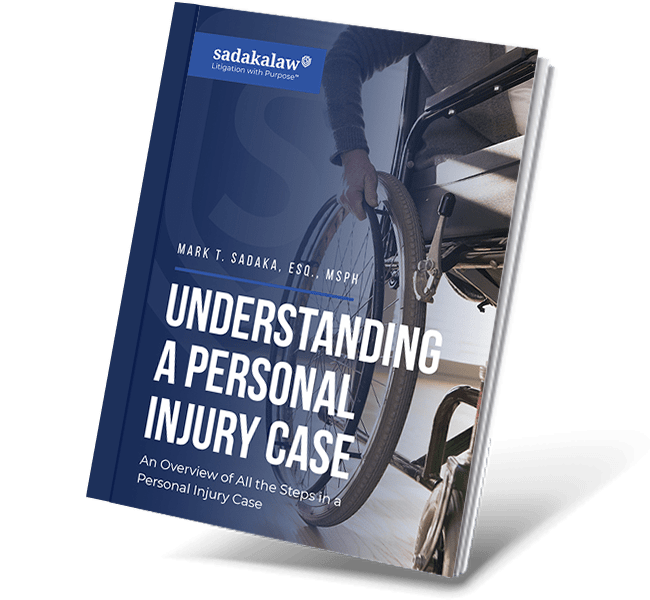Motorcycles are a passion for those who enjoy the freedom of the open road. With all of the perks and sense of community your motorcycle brings you, an increased risk of accidents, injuries, and even death has some riders worried.
New Jersey is known for the turnpike and heavy traffic. This congestion means that increased accidents, especially those involving motorcycles, are inevitable.
Since their establishment by Mark Sadaka in 2008, the Law Offices of Sadaka Associates have been serving New Jersey and New York. As personal injury specialists, we focus on what matters most: our clients. We have successfully represented thousands of legal cases involving personal injury over the years.
You may be wondering: If I am involved in a motorcycle accident, what are the steps I need to take? While no one should be expected to think clearly at the moment of the accident, as emotions are high and injuries are likely, keeping the following steps in mind can go a long way in mitigating the stress of dealing with the aftermath.
1: Contact Your Local Police and File a Police Report
Immediately following a motorcycle accident, you must contact your local police department and file an official report. A police report is crucial; it ensures that your side of the story is heard and on record.
It forces the at-fault driver to explain how they caused the accident that injured you. It also allows for a record of any witnesses. Last but not least, it provides your insurance provider with the at-fault driver’s information. When making a claim, you will need all of this info, and an official police report will create a stronger case in your favor.
2: Report All Injuries, No Matter How Small
After being involved in a motorcycle accident, a report of all injuries and symptoms from which you are suffering is essential. Report your symptoms and injuries to the police or EMS, as well as doctors and nurses at the emergency room. All of these injuries and symptoms should be recorded and put into a file for you. Even if your injuries seem miniscule, it is important to report them anyway.
Some injuries may seem trivial at first but can develop into a full-blown emergency within days, such as a concussion or a TBI (traumatic brain injury). A few symptoms you’ll want to report immediately are:
- Any loss of consciousness
- Loss of memory
- Feelings of disorientation
- Difficulty staying awake
- Difficulty with thinking
- Headaches
- Lightheadedness
- Ringing in your ears
- Slurred speech
- Blurred vision
3: Seek Medical Help
Even if you are feeling okay after your accident, being seen by a medical professional ensures that you are truly okay. Many injuries that seem to be minor can turn into life-threatening or chronic conditions if not treated properly.
Time is of the essence, and it is vital that you do not delay seeking medical treatment after a motorcycle accident. Be sure to report any new symptoms as well during any follow-up visits with your doctor.
4: Do Not Give Statements to Insurance Adjusters
Why should you reach out to your lawyer before talking to an insurance adjuster? It’s simple: The only reason that claims adjusters want to talk with you is to get your denial or minimization of injuries on record. Later, they will use those statements against you and “prove” that you are uninjured, denying your claim for benefits and compensation.
If an insurance adjuster or anyone else is insistent on speaking to you, give them the number of your lawyer. The same applies to an insurance adjuster assessing damage at the scene.
5: Do Not Sign Anything Before Speaking with Your Lawyer

Signing a release, settlement, or waiver from an insurance company can work against proving your injuries when claiming benefits or compensation. Such waivers contain language in the fine print that essentially releases the insurance company from all liability for benefits and financial compensation after your motorcycle accident.
These waivers will also trick motorists and motorcycle riders into accepting a settlement of their claims for much less than they are owed. Do not speak with any insurance provider for any reason without first consulting your lawyer. Lawyers are trained to represent you with your interests in mind.
6: Obtain a Copy of Your Police Report
Keeping a record of your police report is a sound idea, and contacting the police department local to where your accident happened is easy. You can order your report online or simply go to the physical police station and speak with the records department. They are not allowed to keep your record from you, as it is public information.
7: Apply for No-Fault Benefits
Immediately notifying the applicable insurance agency is crucial when filing your application for no-fault benefits. This must be done as soon as possible. Filing the application protects your no-fault rights and ensures that you are able to receive benefits. These can include but are not limited to:
- Coverage of medical bills
- Reimbursement for mileage and transportation to motorcycle accident-related medical appointments
- Reimbursement of lost wages
Experienced legal know-how can mean the difference between you receiving fair compensation and not receiving benefits at all. The attorneys at the Law Offices of Sadaka Associates are here to assist.
8: Check Your Auto Insurance Policy
It’s important to have an experienced attorney look over your insurance policy after a motorcycle accident, especially if you are claiming no-fault benefits. You will need to know the level of no-fault benefits medical coverage to which you are entitled as this will determine how the auto insurance company will pay toward any medical bills related to the accident.
Your attorney should also check your auto insurance policy for specific notation requirements in regard to your motorcycle accident. It is also not uncommon for insurance companies to include an “other owned vehicle” in their policies. This allows them to deny coverage to their customers when they are injured by another insured driver while riding a motorcycle that is not explicitly listed in your policy.
This is an example of the legal specificities that your attorney will have the knowledge to find and understand, using them to your benefit.
9: For Serious Injuries, What Is the Typical Legal Process?
This is a question that most victims of a motorcycle accident ask themselves. Involving more parties in your accident may seem to be a hassle, but you do not want to miss out on potential compensation and peace of mind knowing that you did all that you could. So, what are the legal steps you should take?
- Obtain a personal injury lawyer.
- Make an insurance claim; you will need to contact the at-fault party’s insurance company to do so.
- Collect all necessary information, such as medical history, invoices on motorcycle damage, medical bills, etc.
- Make negotiations on settlements. Your attorney will most likely do this on your behalf.
- Reach an agreed-upon settlement amount or file a lawsuit. If you disagree with the offer given to you from the at-fault party’s insurance agency, a suit is then filed and taken to court.
And what happens if you take your settlement to court? If you are unhappy with the offer given, the following steps will be necessary:
- You and your lawyer will submit a document of damages and the compensation or benefits you are looking to obtain.
- You will testify under oath during the litigation period.
- The case will eventually go to trial, during which the jury will discuss the evidence.
- The jury and judge will eventually reach a decision about your case, and if compensation is decided upon in your favor, it will be awarded to you.
While these steps may seem overwhelming, it is in your best interest to work with an attorney for your personal compensation. With the assistance of a personal injury lawyer, a settlement plan can be created for injuries, pain and suffering, lost wages, or other financial burdens.
10: Talk to an Experienced Attorney After Your Accident
If you take away anything from this list, remember to speak to an experienced attorney after your motorcycle accident. At the very least, you will know that you have covered all of your bases and will have your questions answered. An attorney will have your best interests in mind when figuring out a settlement that works for you.
With all of the legalities involved in accidents, it is imperative to avoid navigating the road to compensation alone. You will want a professional there beside you. The attorneys at the Law Offices of Sadaka Associates are here to guide you through the detailed legal process following a motorcycle accident. If you or a loved one has been involved in a motorcycle accident, give us a call today at 180-0810-3457 so that we can assist you.

